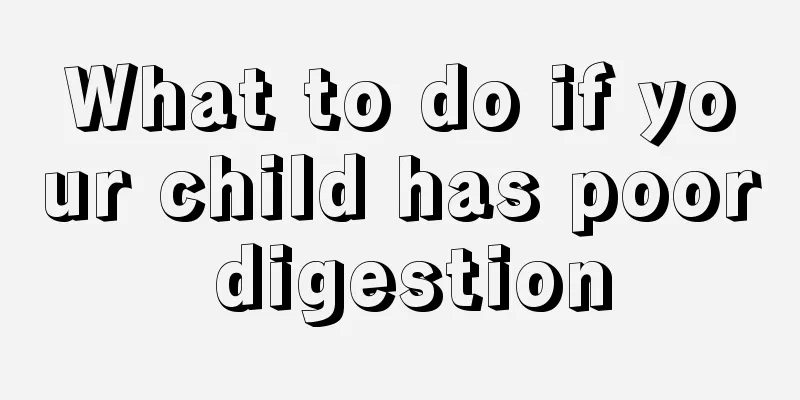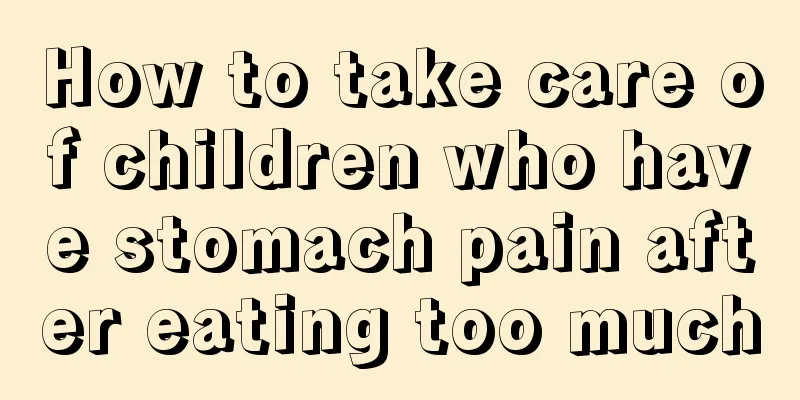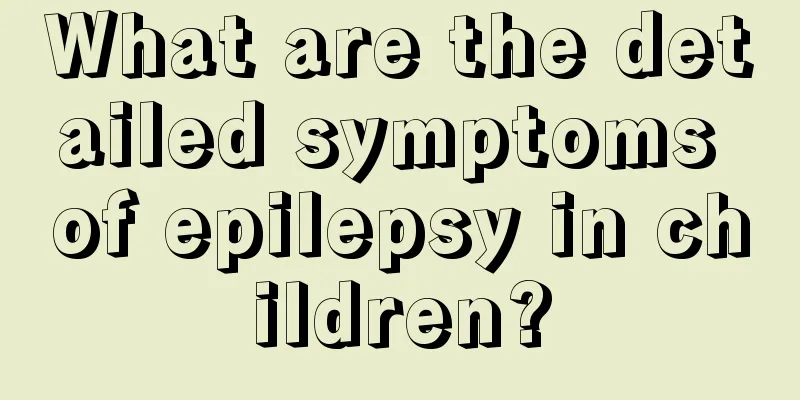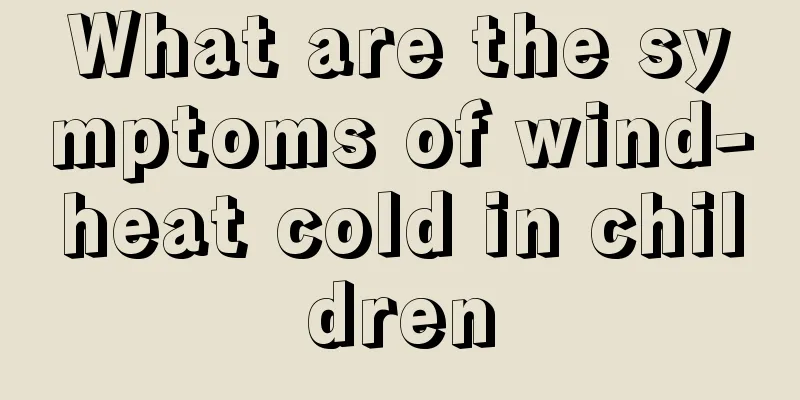What is the best thing to eat when a child vomits?

|
Vomiting is the most common phenomenon when children are sick. Many parents are very scared when they see their children vomiting, wondering if their children have some gastrointestinal disease. If their children don’t eat, many parents are also very worried about their children’s diet problems. Many parents will be very worried when they see this phenomenon in their children, and they don’t know what is best to eat when their children are vomiting? Now let’s take a look at what is best to eat when children vomit? At the same time, let's also analyze the reasons for vomiting? Among the various reasons, the most important ones are: 1. Improper feeding or eating: Overfeeding during the neonatal period, improper milk formula, swallowing large amounts of air while feeding; infants and young children eating large amounts at one time or food that is difficult to digest. 2. Abnormal digestive function: Systemic infectious diseases. If you suffer from upper respiratory tract infection, bronchitis, pneumonia, sepsis and other diseases, you will often experience vomiting along with high fever, nausea, loss of appetite, etc. 3. Digestive tract infectious diseases: gastritis, enteritis, dysentery, appendicitis and other diseases can cause reflex vomiting due to local irritation, which is often accompanied by other digestive system symptoms such as nausea, abdominal pain and diarrhea. 4. Neurological diseases: Central nervous system diseases such as encephalitis, meningitis, intracranial hemorrhage or tumors, and craniocerebral trauma can also cause vomiting, which is characterized by no nausea before vomiting and projectile vomiting, but is often accompanied by other symptoms of the nervous system, such as headache, mental depression, drowsiness, and even convulsions and coma. 5. Mental factors: Some children may vomit due to excessive mental stress or anxiety caused by certain reasons. Recurrent vomiting is sometimes related to mental factors. 6. Poisoning: including various poisonings, such as food poisoning, poisonous animals, plants, drugs, pesticides, etc., almost all of which have vomiting symptoms, but different poisonings have their own clinical characteristics for identification. 7. Others: Vestibular dysfunction of the inner ear or Meniere's disease (hydromatous accumulation in the inner ear membrane and labyrinth) causes severe vomiting, but is often accompanied by vertigo and spinning vision; congenital gastrointestinal malformations in children, such as gastric torsion, hypertrophic pyloric obstruction, etc. In addition, vomiting is also severe in children with intestinal ascariasis who have intestinal obstruction or biliary ascariasis. After parents understand the above-mentioned causes of vomiting, they can analyze them in combination with their children's performance. With an idea in mind, they will not panic when vomiting occurs. Vomiting can be seen in many diseases, such as brain disease, gastrointestinal disease, upper respiratory tract infection, inappropriate food, etc. When a child vomits, parents should pay attention to the following aspects: ① Let the child sit up and turn his head to one side to prevent vomit from entering the trachea. ② After vomiting, rinse your mouth with warm water to clean your mouth and remove bad odors. Babies can clean their mouths by feeding them water frequently. ③ Feed water frequently, allow the baby to drink small amounts frequently, and ensure water supply to prevent excessive water loss and dehydration. The water temperature should be hotter in winter and cooler in summer. Warm water can easily cause vomiting. ④ Pay attention to your diet, don’t eat too much, and try to eat small meals frequently. Do not eat greasy, spicy or sour foods to avoid irritating the stomach and intestines. After vomiting, you should first eat liquid food or semi-liquid food (such as rice porridge or noodles), and gradually transition to a normal diet. ⑤ Pay attention to the vomiting situation, the relationship between vomiting, diet and coughing, the number of vomiting, the vomited stomach contents, etc. ⑥ Try to rest in bed and avoid changing your body position frequently, otherwise it will easily cause vomiting again. Vomiting in children is often caused by digestive dysfunction, so when a child vomits, the first thing to do is to temporarily fast to give the digestive tract some time to rest. You can first give the child some light sugar salt water or light tea, and the child will be fine after a few hours or 1 to 2 days. If a baby occasionally vomits after feeding, it may be that he has swallowed air. The nipple should be blocked during the next feeding to prevent him from swallowing air. After sucking, you can hold the baby and pat his back gently to let the air out. Then lie on the right side with the upper body slightly raised. If the child vomits frequently after sucking milk but is generally normal, he may have pyloric spasm and should be given some antispasmodics under the guidance of a doctor. When general nutritional status is affected, you should prevent pyloric hypertrophy and consult a doctor. If severe vomiting occurs repeatedly, including spitting out yellow water, and general care does not improve the condition, you should be careful about intestinal obstruction. If accompanied by other conditions such as fever, the details should be reported to the doctor. If you find that the vomitus is abnormal, you should bring it to your doctor so that the doctor can analyze the cause of the vomiting and deal with it promptly and correctly. There are many reasons for baby vomiting. One is that it is caused by eating bad food. Adjust the diet and drink more water and it will get better after some time. If it is pathological, such as caused by a cold, you need to take some medicine. You should take it to see a doctor. Some are caused by indigestion. You can rub your stomach clockwise with your hands. When a child vomits, you must first find out why he or she is vomiting so that you can give the child the right medicine. Also, you should give the baby some digestive medicine and some appetizers so that the child's appetite will improve. In the first few days of vomiting, you should be careful not to let the child eat too much. Eating too much will also cause indigestion, which is not good for digestion. Don't give children food that is easy to cause inflammation. This way the child will get better quickly. |
<<: What supplements are best for children with anemia?
>>: What medicine is better for children with diarrhea?
Recommend
Causes of baby's fontanelle twitching
For a newborn, many parents will find out why the...
Why does drinking breast milk cause diarrhea?
Why does drinking breast milk cause diarrhea? If ...
What foods are good for the fetus?
Every expectant mother and father looks forward t...
Diet for asthma in children
Environmental pollution is becoming more and more...
What to do with oral herpes in children
The incidence of oral herpes in children is relat...
Treatment of spitting up in one-month-old babies
The birth of every new life makes our parents ver...
What to do if your child doesn't brush his teeth
When babies are young, there are some things they...
Can a child's gene mutation be treated?
From a scientific point of view, gene sequences a...
What is the reason why the baby's poop is a little watery?
Loose stools are a typical symptom of diarrhea. W...
What is the normal temperature of a baby's forehead?
The health of the baby is a very important basic ...
Is it okay for a two and a half year old baby to sleep on his stomach?
A good sleeping position is very important for ba...
How to deal with your child's rash
We often hear that children have rashes, commonly...
Are there any precautions for children’s orthodontics?
When children are in the process of replacing the...
Treatment of kidney disease in children.
Now there is a group of children, around 3-6 year...
What is the reason for redness and pain on girls’ vulva?
It is not difficult to find that children are mat...









